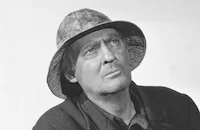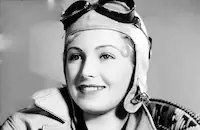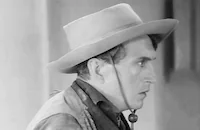The Road to Glory
Brief Synopsis
Cast & Crew
Howard Hawks
Fredric March
Warner Baxter
Lionel Barrymore
June Lang
Gregory Ratoff
Film Details
Technical Specs

Synopsis
In France during World War I, Captain Paul La Roche prepares his regiment to return to the front and bids farewell to his young sweetheart, Monique La Coste. Monique, who is loyal to Paul because he saved her family, gets caught outside in an air raid and is rescued by Lieutenant Michel Denet, who falls in love with her. Michel then reports to Paul, and the regiment goes to the front, where they discover that the Germans are planting mines under the trenches. As Paul leads his men away after their tour of duty, the mines explode, killing the relief regiment. Later, Michel finds Monique, and she falls in love with him but does not tell him about Paul. At headquarters, while the men prepare for the biggest Allied attack to date, Michel and Paul discuss Monique, and Michel realizes that Paul is in love with her. After their discussion, Paul addresses his new troops and spots his father, who is using the name Private Morain. Although proud of his father's bravery, Paul fears for his safety and orders him to return behind the lines. When Monique visits Michel, who is now aware of her relationship with Paul, he forbids her to tell Paul about them and tells her that their affair is over. After she leaves, however, Paul finds the crucifix he had given to her in Michel's room. Meanwhile, Paul's aide, Sergeant Bouffiou and Morain "accidentally" burn the old man's transfer order and then join the others at the front. After a grueling battle, the regiment succeeds in reaching their goal, but a volunteer team is needed to establish a further telephone observation post. Michel, Morain and five others go on the dangerous mission, but halfway there, Morain becomes terrified and must stay behind. As Michel and the others return, the old man mistakes them for Germans and throws a grenade at them. The survivors return to Paul at the first outpost and try to cover up for Morain, but he confesses. Michel then goes to a nearby hospital in which Monique is a nurse, and Paul walks in as she kisses Michel. When they try to explain their actions, Paul seems unmoved, and they then realize he has been blinded. Paul receives orders that the Allies are beginning a counter-barrage that must be directed by an operator at the telephone outpost, who will face certain death. Paul sends Michel to the regiment while he and Morain sneak off to the outpost, with the old man leading his blind son. They successfully direct the barrage and Morain sounds his bugle as they are killed. Back at headquarters, Michel is now the captain in charge of the regiment. As he readies the new replacements to go to the front, he gives the same speech that Paul always gave.

Director

Howard Hawks
Cast

Fredric March

Warner Baxter

Lionel Barrymore

June Lang

Gregory Ratoff
Victor Kilian
Paul Stanton

John Qualen
Julius Tannen
Theodore Von Eltz

Paul Fix

Leonid Kinskey
Jacques Lory
Jacques Vanaire
Edythe Raynore
George Warrington
Eugene Borden
Louis Mercier
Joe Cunningham
Constant Franke
Jean De Briac
Ben F. Hendricks
Jean Perry
Nicholas Soussanin
Barlowe Borland
Anne O'neal
Paul Mcvey
Robert Graves
John Bleifer
Bob Cautiero
Pat West
Karl Hackett
Frank Mcglynn Jr.
Ronald J. Pennick
George Kerebel
Albert Dresden
Bryson Rogers
Paul Du Val
Jess Caven
Wingate Smith
Hector V. Sarno
Eddie Foster
Baron Lichter
Crew
Stephen Morehouse Avery
Edw. Curtiss
William Faulkner
Violet Kemble-cooper Ferris
Walter Ferris
Ray Flynn
Howard Hawks
Roger Heman
Nunnally Johnson
Nunnally Johnson
Georges Jomier
George Leverett
Claude Joseph Rouget De Lisle
Thomas Little
Ed O'fearna
Hans Peters
Joel Sayre
Louis Silvers
Gregg Toland
Gwen Wakeling
Darryl F. Zanuck
Darryl F. Zanuck

Film Details
Technical Specs

Quotes
Trivia
Notes
The working titles of this film were Wooden Crosses and Zero Hour. According to information in the Twentieth Century-Fox Records of the Legal Department at the UCLA Theater Arts Library, The Road to Glory incorporated scenes from a 1932 Pathé-Natan film entitled Les croix de bois. The French film, directed by Raymond Bernard, was based on the book of the same name by Roland Dorgelès, which was published in France in 1919. Pathé-Natan had distributed their film in Europe, where it was very sucessful. When Fox purchased the French film in 1932 for $140,000, Pathé-Natan retained the right to distribute the picture in some countries, such as France, Belgium, Palestine and Brazil, and eventually Fox decided not to distribute it in the United States. Part of their contract with Pathé-Natan was that they had to clear with the French company the worldwide rights to distribute any film using footage from Les croix de bois. Approximately 651 feet of battle scenes and scenes of parading soldiers from the French film were incorporated into the 1934 Fox film The World Moves On (see below) without any problem. An unknown amount of footage was also incorporated into the films Cavalcade and the 1936 version of Seventh Heaven (see below). Although Twentieth Century-Fox maintained that The Road to Glory was developed from an original story by Joel Sayre and William Faulkner, in conjunction with director Howard Hawks, producer Nunnally Johnson, executive producer Darryl F. Zanuck and other contributing writers, several of the writers' assignments state that their works are based on the screenplay of the French film. While The Road to Glory was in production, Dorgelès threatened to sue, claiming that his contract with Pathé-Natan stipulated that only one film could be made from his book. Dorgelès stated that he would be willing to drop the claim for a small sum if the American film was "in no way anti-French," and if "it in no way favors war, but tends on the contrary to create a desire for peace." Despite their claim that the story was original, the studio settled with Dorgelès in May or June 1936, buying the rights to his book and the rights from Pathè-Natan to distribute The Road to Glory worldwide. According to the legal records, one of the reasons why Twentieth Century-Fox was willing to settle with Dorgelès was to circumvent a potential lawsuit by Humphrey S. Cobb and Paramount. Paramount, which owned the rights to Cobb's book Paths of Glory was upset by the similarity of the two titles and also claimed that The Road to Glory was plagiarized from Cobb's book. In an April 18, 1936 telegram to a studio lawyer, Zanuck stated that the studio would be willing to settle with Dorgelès for $10,000, and that "if we do own rights to [the] Dorgelès story this would of course eliminate any chance of plagiarism suits from Humphrey Cobb or anybody else who might have imaginary grievances." Apparently no further action was taken by Cobb or Paramount.
According to information in the legal records, Charles Boyer and Henry Fonda were considered for leading parts in the film, and the part of Monique La Coste was originally intended for Simone Simon. The records also note that writer Mark Kelly, who was assigned to the picture, did not actually work on it. Lionel Barrymore was borrowed from M-G-M for the production, and photographer Gregg Toland was on loanout from Samuel Goldwyn's company. The end credits of The Road to Glory contain a written statement reading: "This picture has introduced to you a new Twentieth Century-Fox screen personality MISS JUNE LANG." This was not her first film, however, as she had appeared in numerous earlier pictures under the names June Lang and June Vlasek.
The legal records also contain information on three claims against Twentieth Century-Fox for plagiarism. One of the lawsuits was brought by Robert H. Sheets, who alleged that in early 1935, he had submitted a scenario entitled "The Road to Glory" to the studio and that his scenario was plagiarized after being rejected. On June 4, 1940, Twentieth Century-Fox won the case after a federal judge ruled that Sheets had not submitted his scenario to the studio, and had himself plagiarized it from a novelization of the film printed in the July 1936 issue of Silver Screen. In the legal documents used during the case, it was revealed that some of the war sequences from Les croix de bois were actual battle scenes shot by the French government during World War I, and that Walter Ferris and his wife, Violet Kemple-Cooper Ferris, contributed to the completed script of The Road to Glory. Another claim was brought by Charles Vidor and Leon Gordon, who asserted that the studio had plagiarized their original story outline entitled "Discipline." The records reveal that when contributing writer Stephen Morehouse Avery was assigned to the picture, he suggested certain aspects of Vidor and Gordon's story, notably a father-son relationship, to Nunnally Johnson. Johnson apparently vetoed the suggestion, until later, after Avery had left the project, he remembered the idea and a father-son relationship was included in The Road to Glory. Although Avery claimed that he had informed Johnson that the idea was Vidor and Gordon's, Johnson denied this. Despite the studio's legal advisors' statement that the two stories were not similar enough to justify a case of plagiarism, the studio purchased Gordon and Vidor's story for $2,500 to prevent the claim from going to court. A third complaint was lodged against the studio by Ivan Lebedeff, who alleged that an incident from his story "Legion of Dishonor" had been plagiarized. The disposition of Lebedeff's claim has not been determined. This film is not related to a 1928 picture entitled The Road to Glory, which was also directed by Hawks (see AFI Catalog of Feature Films, 1921-30; F2.4644).












